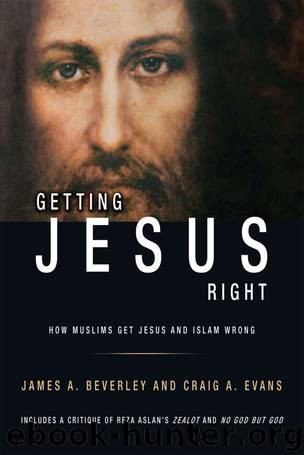Getting Jesus Right: How Muslims Get Jesus and Islam Wrong by James A Beverley & Craig A Evans

Author:James A Beverley & Craig A Evans [Beverley, James A]
Language: eng
Format: epub, mobi
Tags: Religion & Spirituality
ISBN: 9781927355466
Publisher: Castle Quay Books
Published: 2015-05-31T23:00:00+00:00
“O Mary! Allah gives you good news with a word from him: His name will be Messiah Jesus, son of Mary…He shall speak to the people when in the cradle and when of old age…” And she said, “My Lord, when shall there be a son (born) to me, since man has not touched me?” He said, “Even so, Allah creates what he pleases…” (surah 3:45–47; cf. 19:20–22; 21:91)
In this convoluted passage we hear unmistakable allusions to Luke’s account. These include allusions to the angel Gabriel’s announcement to Mary (“Hail, O favored one”), to the effect that she will conceive and give birth to a son, whose name will be Jesus (Luke 1:28, 31), to Mary’s puzzlement because she is a virgin (1:34) and to the angel’s explanation (1:35). Of course, the version in the Qur’an says nothing about Jesus being recognized as the “Son of the Most High” and “Son of God,” as in the angel’s announcement in Luke 1:32 and 1:35, for Muhammad rejected the divinity of Jesus and the doctrine of the Trinity (see surah 4:171: “Say not ‘Trinity’!”; cf. 5:17, 72, 75, 116; 9:30–31; 19:19, 88, 91–92).12 Nevertheless, Muhammad appears to have accepted most of the Christian tradition regarding the annunciation, the immaculate conception, the virgin birth and presentation of the youthful Jesus in the temple.13
The Qur’an’s comment that Jesus “shall speak to the people when in the cradle” (surah 3:46) is odd. It probably alludes to the apocryphal story in the already mentioned Arabic Gospel of the Infancy. In this very late work the infant Jesus quite literally speaks from the cradle.14 The Arabic Gospel of the Infancy has drawn from the Gospel of Luke and some later apocryphal traditions. The idea that as a child Jesus was a prodigy may owe its inspiration to the much older story of the 12-year old Jesus, who discusses theology with the religious leaders in the temple precincts (Luke 2:46–52). This theme is elaborated in later apocryphal sources, where we hear stories of Jesus who as a young child astounds the teachers of Israel. One of the better known examples is Infancy Gospel of Thomas, where we are told that Jesus stupefies one Zacchaeus, a schoolteacher, with his great knowledge (Infan. Thom. 6–8). Humiliated, Zacchaeus confesses that he has been bested by a child and says to Joseph, “What kind of great thing he could be—whether a divine being or an angel—I do not know even what to say” (Infan. Thom. 7:4).15 We suspect that traditions such as what we find in Arabic Gospel of the Infancy and Infancy Gospel of Thomas lie behind surah 3:46.
The passage in the Qur’an goes on to say that “Allah will teach him the Book and Wisdom, the Law and the Gospel” (surah 3:48). These items probably refer to the Jewish and Christian Scriptures. Of course, the “Gospel” (Arabic: injeel), which is derived from the older Greek word euangelion, could refer to the message that Jesus was to proclaim throughout his ministry and not necessarily to the New Testament Gospels themselves, though sometimes this word does.
Download
Getting Jesus Right: How Muslims Get Jesus and Islam Wrong by James A Beverley & Craig A Evans.mobi
This site does not store any files on its server. We only index and link to content provided by other sites. Please contact the content providers to delete copyright contents if any and email us, we'll remove relevant links or contents immediately.
The Hatha Yoga Pradipika (Translated) by Svatmarama(2484)
Real Sex by Lauren F. Winner(2476)
The Holy Spirit by Billy Graham(2418)
The Secret Power of Speaking God's Word by Joyce Meyer(2253)
The Gnostic Gospels by Pagels Elaine(2027)
Devil, The by Almond Philip C(1900)
23:27 by H. L. Roberts(1893)
Jesus by Paul Johnson(1887)
The Nativity by Geza Vermes(1849)
All Things New by John Eldredge(1782)
Chosen by God by R. C. Sproul(1761)
Angels of God: The Bible, the Church and the Heavenly Hosts by Mike Aquilina(1628)
The Return of the Gods by Erich von Daniken(1573)
Angels by Billy Graham(1550)
Evidence of the Afterlife by Jeffrey Long(1460)
Knowing God by J.I. Packer(1432)
The Gnostic Gospel of St. Thomas by Tau Malachi(1413)
Victorian Sensation by James A. Secord(1406)
How To Be Born Again by Billy Graham(1404)
